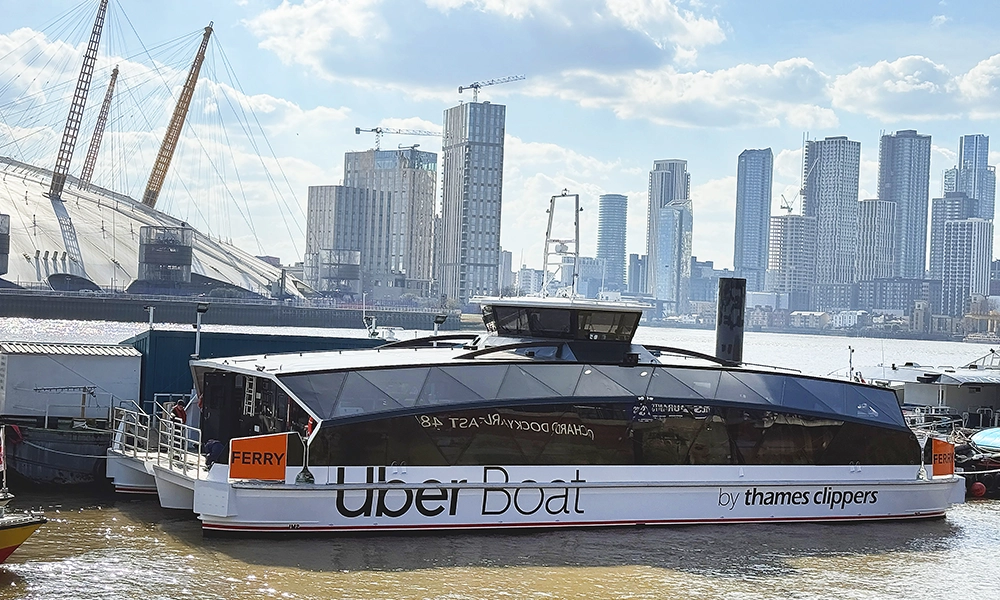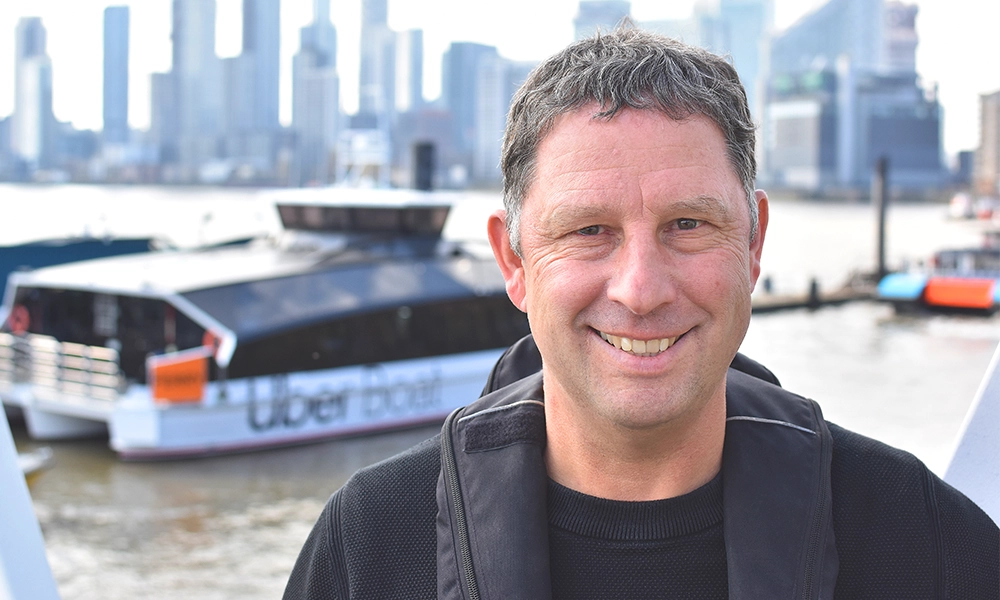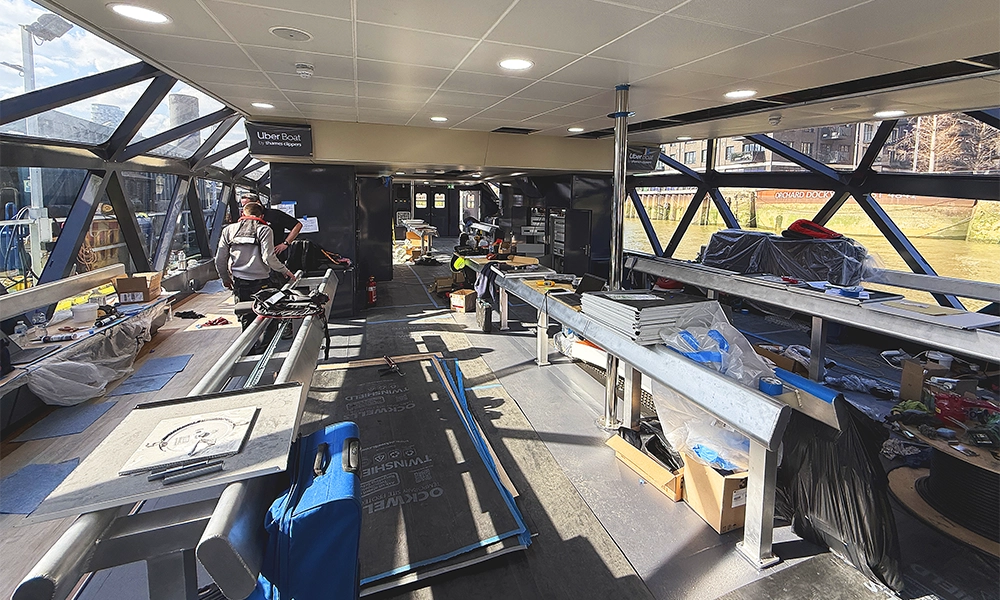Operating on Uber Boat By Thames Clippers cross-river route, she will serve Canary Wharf and Rotherhithe when operating

Subscribe to our free Wharf Whispers newsletter here
Orbit Clipper isn’t quite ready yet.
But it won’t be so very long before she’s carrying passengers and cyclists from Rotherhithe to Canary Wharf and back.
When that happens, it’s not an overstatement to say London’s public transport will have entered a new era – one where vessels on the river are powered by electricity.
“She’s the first of her kind, not just for us, but in the country and, when considering the way she operates, possibly in Europe and perhaps even the world,” said Sean Collins, CEO and co-founder of Uber Boat By Thames Clippers.
“Orbit Clipper is designed as a double-ended ferry, which is nothing new – it’s a well established method for loading and unloading vehicles, passengers and cyclists.
“What’s different is that when she’s in operation, the route will feature automated docking on both sides.”
This innovation is essential.
One of the things limiting the wider adoption of electricity as a power source for boats is the battery capacity.
In order to perform effectively, Orbit needs to top up her reserves each time she reaches a pier, disengaging her engines and effectively plugging in.
When Thames Clippers’ other vessels visit a pier, the captain holds the craft steady against the currents of the river using its engines which, in combination with ropes, allow gangways to be lowered, passengers to get on and off and then a speedy departure.

automated docking
“To work properly, Orbit has to be fully secured so power can be disengaged,” said Sean.
“There will be an arm that extends and pulls her into the dock, which gives the batteries some downtime and that’s what allows us to operate over a full day before she recharges fully overnight at Canary Wharf.
“While Orbit will depart and arrive from the piers automatically, a captain will be in command of the vessel as she travels across the river.
“At present we still need that although there may be a time in the future when that’s no longer the case.
“It’s a challenge because there are so many other vessels on the water and with the navigational rules we have, the ferry doesn’t have the right of way.”
The plan for Orbit is that she will cross the river every 10 minutes on weekdays and every 15 minutes at weekends.
This is similar to the service level provided on the route by the previous ferry, but the new boat offers a considerable increase in capacity.
“She caries a lot more people and there’s room for 100 bikes too, so the boarding may take slightly longer,” said Sean.
“I think the demand will be there for this route – you have to build for the future.
“Looking at the way the world has changed – the amount of food deliveries that are now being done by push bike, for example – there’s so many more opportunities around zero-emissions transport.
“As part of this project, we’ve improved access to the pier at Doubletree By Hilton London Docklands Riverside with a bridge over Nelson Dock that connects to Southwark’s cycle network.
“We’ve reduced the gradient of the walkways down to the river and passengers will be able to access the ferry from Rotherhithe Street.”

reducing emissions on the river with Orbit Clipper
Supported by Innovate UK and built on the Isle Of Wight, Orbit is the latest project for Thames Clippers in its ongoing pursuit of environmentally friendly transport solutions.
Aiming for net-zero emissions by 2050 and a 50% reduction by 2035, the company recently launched its third hybrid boat, Mars Clipper, as part of its river bus fleet.
Currently, Orbit is finalising her fit-out at Trinity Buoy Wharf before a programme of testing between Rotherhithe and Canary Wharf can begin.
As the automated docking system is completely new, Sean and the team need this time to ensure everything is working as it should before their first zero-emissions craft welcomes members of the public.
“The ferry route was an obvious one on our network for us to look at converting to an all-electric craft,” said Sean.
“Each journey across the river is just over a minute long and electrical power works well for that sort of duration. It’s the right thing to do for the environment.
“At the moment all-electric operation would not work for our longer routes as each vessel would have to fully recharge for an hour for every loop.
“The amount of batteries we’d need to carry would also make the boat very heavy, which would have repercussions for stability and safety.
“At the moment we turn boats round in 10 or 15 minutes between loops – charging just wouldn’t work commercially.”
scope to expand
“However, I see systems like the one we’ve developed for Orbit as being of national, even global significance, as a way to cross rivers without impacting the free navigation of vessels on them,” said Sean.
“When you look at bridges that lift to allow boats under, they create significant delays for traffic and pedestrians and the boats can’t go on their way unless they’re raised.
“Tunnels are often difficult to access, especially if elevators have broken down.
“We’ve got to be thinking about getting people out of their cars and onto public transport and boats like Orbit provide a really great alternative for people who need to cross the river on foot or by bike.
“She has multiple doors at either end so people can walk their bike on, stand next to it and then push it off when they reach the other side.
“We’re aiming to launch it in the spring or summer, but the system is a completely new design, an engineering first, so it does need testing thoroughly.
“We’re really thankful to Innovate UK, Canary Wharf Group, and the Port Of London Authority as well as Tower Hamlets and Southwark Councils for supporting us to get this project underway.”
key details: Orbit Clipper
Orbit Clipper is expected to start ferrying passengers between Canary Wharf Pier and Doubletree By Hilton London Docklands Riverside in the summer.
Find out more about Uber Boat By Thames Clippers here
Read more: How Green Pioneer could be the future of decarbonised shipping



